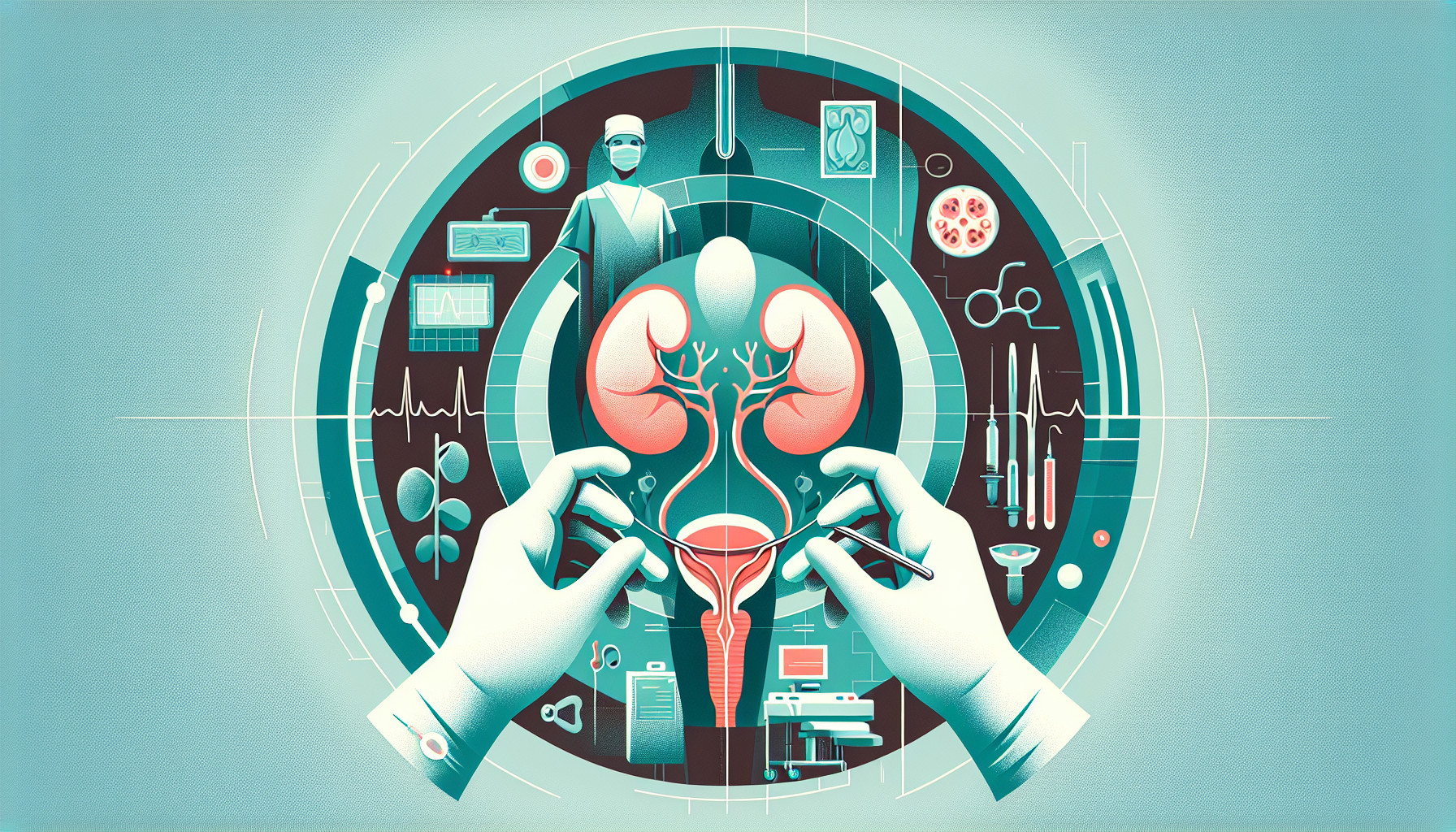Our Summary
The paper talks about the treatment for patients with bladder cancer. The usual treatment is called radical cystectomy, which involves the removal of the bladder. However, the outlook for patients having this operation hasn’t really improved for a long time. The paper suggests some possible ways to make things better. These include choosing high-risk patients more carefully for this kind of treatment, using chemotherapy around the time of the operation, and potentially, using robots to carry out the bladder removal surgery.
FAQs
- What is the standard treatment for patients with bladder cancer?
- Has the prognosis for patients undergoing radical cystectomy changed over time?
- What are some advancements in the treatment of high-risk T1 bladder cancer patients?
Doctor’s Tip
One helpful tip a doctor might tell a patient about bladder surgery is to follow all pre-operative instructions carefully, such as fasting before surgery and stopping certain medications as advised. This can help reduce the risk of complications during and after the procedure. Additionally, it is important to discuss any concerns or questions with your healthcare team before the surgery to ensure you are well-informed and prepared for the procedure.
Suitable For
Patients who are typically recommended bladder surgery include those with bladder cancer that has not responded to other treatments, such as chemotherapy or radiation therapy. Patients with high-risk T1 bladder cancer may also be candidates for bladder surgery. Additionally, patients with muscle-invasive bladder cancer or recurrent bladder cancer may be recommended for bladder surgery. Patients who have a history of bladder stones or frequent urinary tract infections that do not respond to other treatments may also be candidates for bladder surgery. Additionally, patients with bladder dysfunction or bladder outlet obstruction may be recommended for bladder surgery to improve their quality of life.
Timeline
Before bladder surgery:
- Patient is diagnosed with bladder cancer and undergoes various tests and evaluations to determine the stage and extent of the cancer.
- Patient discusses treatment options with their healthcare team, including the possibility of undergoing a radical cystectomy.
- Patient undergoes preoperative preparations, which may include blood tests, imaging studies, and consultations with an anesthesiologist.
- Patient may undergo additional treatments such as chemotherapy or radiation therapy before surgery to shrink the tumor and reduce the risk of recurrence.
- Patient receives detailed instructions on preoperative care, including fasting before surgery and preoperative medications.
After bladder surgery:
- Patient undergoes radical cystectomy, which involves removal of the bladder and surrounding tissues.
- Patient may require reconstructive surgery to create a new way for urine to leave the body, such as a neobladder or ileal conduit.
- Patient is closely monitored in the hospital for complications such as infection, blood clots, or urinary leakage.
- Patient receives postoperative care, which may include pain management, physical therapy, and education on self-care tasks such as emptying the new bladder or stoma.
- Patient undergoes follow-up appointments and tests to monitor for cancer recurrence and address any ongoing issues related to the surgery.
Overall, the experience before and after bladder surgery can be challenging and may involve a significant amount of physical and emotional adjustment. However, with proper care and support, many patients are able to recover and resume their normal activities after surgery.
What to Ask Your Doctor
- What are the potential risks and complications associated with bladder surgery?
- How long is the recovery period after bladder surgery?
- What are the expected outcomes of the surgery in terms of bladder function and quality of life?
- Will I need to undergo any additional treatments, such as chemotherapy or radiation therapy, after the surgery?
- Are there any alternative treatment options available for bladder cancer that may be less invasive?
- How experienced is the surgical team in performing bladder surgery, and what is their success rate?
- What is the long-term prognosis for patients who undergo bladder surgery?
- How will my bladder function be affected after the surgery, and what can I do to manage any changes in bladder control?
- How soon after the surgery can I resume normal activities, such as work and exercise?
- Are there any lifestyle changes or modifications that I should make before or after the surgery to improve the outcomes?
Reference
Authors: Witjes JA. Journal: Nat Rev Urol. 2016 Feb;13(2):74-6. doi: 10.1038/nrurol.2015.272. Epub 2015 Nov 24. PMID: 26597614
